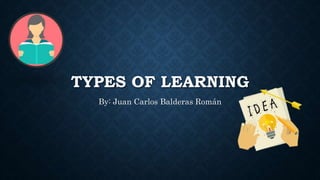
Types of learning
- 1. TYPES OF LEARNING By: Juan Carlos Balderas Román
- 2. • On these slides we want to show some examples of different types of ways a persona can learn.
- 3. EPISODIC LEARNING • Episodic learning is a change in behavior that occurs as a result of an event. For example, a fear of dogs that follows being bitten by a dog is episodic learning. Episodic learning is so named because events are recorded into episodic memory, which is one of the three forms of explicit learning and retrieval, along with perceptual memory and semantic memory.
- 4. MULTIMEDIA LEARNING • Multimedia learning occurs when a learner builds a mental representation from words and pictures that have been presented. For purposes of research program, multimedia instructional messages are presentations of material using words and pictures that are intended to foster learning. The pictures can be static graphics such as photos, drawings, maps, charts, figures, and tables or dynamic graphics such as video or animation.
- 5. E-LEARNING • Is defined as an innovative approach for delivering electronically mediated, well- designed, learner-centered and interactive learning environments to anyone, anywhere, anytime (commonly known as the triple A’s of learning) by utilizing the Internet and digital technologies in conjunction with instructional design principles.
- 6. AUGMENTED LEARNING • Augmented Learning is the next step in the evolution of eLearning to enhance the learner’s experience and demystify real world objects and their environment. It is closely associated with Augmented Intelligence and Augmented Reality. As Augmented Intelligence applies information processing capabilities to extend the processing capabilities of the human mind, Augmented Reality superimposes information based on the learner’s sensory inputs.
- 7. ROTE LEARNING • Rote learning does not have to be meaningless repetition and may help in deeper understanding as well as in accuracy of knowledge in eastern philosophy it is regarded as an essential tool to support deeper understanding because it would develop students’ critical thinking skills.
- 8. MEANINGFUL LEARNING • Process through which the same information is related, in a non- arbitrary way (not literal), with a relevant aspect of the cognitive structure of the individual.
- 9. INFORMAL LEARNING • Is any learning that is not formal learning or non-formal learning, such as self-directed learning or learning from experience. Informal learning is organized differently than formal and non-formal learning because it has no set objective in terms of learning outcomes and is never intentional from the learner’s standpoint. For all learners this includes heuristic language building, socialization, enculturation, and play. Informal learning is a pervasive ongoing phenomenon of learning via participation or learning via knowledge creation, in contrast with the traditional view of teacher-centered learning via knowledge acquisition.
- 10. SITUATED LEARNING • Is a theory that describes the process of learning as highly social, embedded in the lives of learners, and can be complementary to constructivism. Much of the theory of situated learning centers on the notion of communities of practice: dynamic groups that are present throughout our lives in which we participate in various ways. Such groups exist in schools, workplaces, social organizations, and families. Each of these groups has a set of practices that members learn over time.
- 11. FORMAL LEARNING • we can define the Formal learning as a way to learn based on a classroom, that is necessary on the trading of information.
- 12. NONFORMAL LEARNING • This type of learning refers to every kind of learning obtained outside a classroom, as learning on or daily basis.
- 13. TANGENTIAL LEARNING • Tangential learning refers to a type of self- learning in which the learner is exposed to a ludic environment that they already enjoy, for example, when someone plays a music game, the learning is self-motivated to learn a real instrument.
- 14. DIALOGIC LEARNING • when we speak about dialogic learning, we can infer that a dialogue between learner and teacher is implicit, because it take place through dialogue, but in this case, mostly between pairs, taking as the fundament the sharing of ideas.
- 15. INCIDENTAL LEARNING • Incidental learning is when there is a real learning, but it is essentially when the learning is not planned. this can happen in a exploration, observation or experimentation.
- 16. META LEARNING • this is a process of metacognition, in this type of learning the learner is aware of his own learning habits, and is in control of his learning process.
- 17. B-LEARNING • Definitions says, B-learning is a process in which the learner has a mixed context of learning, part of his learning process has to be face to face, and the other can be online, in this situation, the learner is in control of the context and the environment, times and place to learn properly.
- 18. REFERENCES • Dialogic teaching and learning : Faculty of Education. (2018). Retrieved from https://www.educ.cam.ac.uk/research/projects/camtalk/dialogic/ • Dialogic teaching and learning : Faculty of Education. (2018). Retrieved from https://www.educ.cam.ac.uk/research/projects/camtalk/dialogic/ • Klopfer, E. (2008). Augmented Learning : Research and Design of Mobile Educational Games. Cambridge, Mass: The MIT Press. • Learning. (2018). Retrieved from https://en.wikipedia.org/wiki/Learning • Mayer, R. (2002). Psychology of Learning and Motivation. Evanston: Elsevier. • Moreira, M. (2000). Aprendizaje significativo: teoría y práctica. Madrid: Visor. • Woody, M. (2018). Why formal learning shouldn’t be the cornerstone of your learning plan. Retrieved from https://www.docebo.com/blog/what-is-formal-learning/